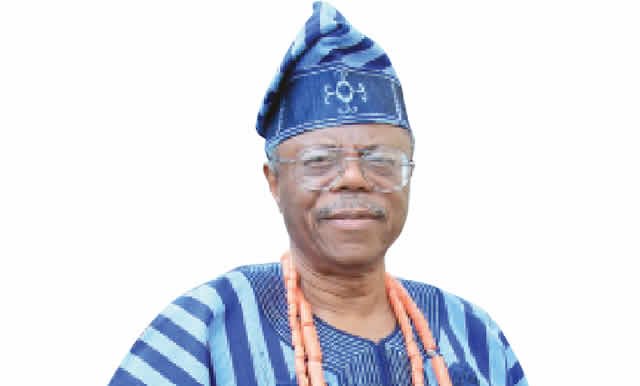
The Jacob and Frances Sanger Mossiker Chair in the Humanities at the University of Texas at Austin, Prof. Toyin Falola, shares his view with GRACE EDEMA on the protest against the appoinment of the new Vice-Chancellor of Obafemi Awolowo University by indigenes of Ile-Ife
As an alumnus of OAU, how will you describe the ongoing VC selection saga in OAU?
The ongoing acrimony between the administration of Obafemi Awolowo University and the leadership of Ile-Ife community is truly regrettable. Never in our history as a nation, or as an ethnic group, for that matter, has there ever been such a disgraceful show of tussle between the town and the gown. Frankly, the academic institution should serve as a model for other institutions and government bodies, and Ile-Ife, as the reputed cradle of civilisation and ancient home to all ‘omo bibi Oduduwa’, ought to preserve the heritage of the Yoruba people with reverence and serve as an example to other communities and cities, not only in the South-west region but in the entire country. However, the leadership of both institutions have failed to stand up to their calling. Instead of reconciling their differences amicably, the parties have turned to street protests, media warfare and the likes.
As a professor of History and African studies, what do you have to say about the use of masquerades, sacrifices and other occultic/traditional paraphernalia used during the protest?
Traditional paraphernalia are a part of the cultural heritage, history and identity of any community or people. As a Yoruba community, Ile-Ife bears some similarities with most other Yoruba communities or cities in terms of traditional paraphernalia, cultural heritage and history. One of such similarities is the reverence that Yorubas pay to masquerades. If our knowledge of our culture and history serves us right, we will recall that masquerades were never used as objects for political action. Neither were they ever reduced to entertainers. However, in the recent protest staged by members of the Ife community against the administration of the Obafemi Awolowo University, masquerades and other traditional paraphernalia were used without proper consideration for what they represent in the light of the activity. I understand that the protesters may easily claim that the masquerades they used were not real, but that does not excuse their actions. They should have accorded more respect to the masquerades and other paraphernalia that were used.
Considering your international exposure in tertiary education and achievements, what are the major criteria to be considered when selecting VC?
My experience is mainly with American and Nigerian universities, but the norm seems to be general across all other academic systems around the world. From my observations, most reputable tertiary institutions select the Vice-Chancellor in accordance with some established guidelines. Usually, a high-ranking official or a team of the highest-ranking officials will set up a nominating committee to oversee the nomination and selection process for the oncoming Vice-Chancellor. Academics who are interested in running for the office may then nominate themselves or someone else for the position. Persons nominated for such roles must be of impeccable character and meet the required qualifications. Candidates for the office of the Vice-Chancellor are expected to be academics with an excellent reputation, vast academic experience and strong leadership abilities.
Should ethnicity, religion be a factor?
I am afraid there is no straight answer to this question. Ordinarily, ethnicity and religion should not be criteria for choosing the Vice-Chancellor of a federal university or any other public officer. This is in agreement with the provision of the 1999 Constitution of the Federal Republic of Nigeria, which states that the freedom of all Nigeria from discrimination is a fundamental right, a section that has been quoted several times over by members of the Ife community leadership board to press their demands. Non-discrimination in the appointment of public officers is particularly important to preserve peace and security and promote unity between people of diverse ethnic and religious groups in the country. Assuredly, if any government agency or public institution makes it a practice to exclude members of a particular religion or ethnicity, it will create an unsafe work environment for members of other religions or ethnicities because they will not be confident that their performance will be rewarded or appreciated. This may threaten peaceful relationships between the people of the favoured religion and ethnicity and the disfavoured ones, which may eventually aggravate to form part of the militating ethno-religious conflicts in the country. Another issue that may arise from such practice is the sacrifice of meritocracy on the altar of ethnic and religious nepotism.
On what conditions should an indigene be considered?
Following what I have just said, ethnicity and religion may be considered in rare circumstances where there is suspicion that some ethnic or religious groups feel neglected or marginalised in the selection process. Just as the 1999 Constitution provides the right to freedom from discrimination, it also upholds the federal character principle, which is one of the few mechanisms introduced by the constitution to promote unity in diversity among the different ethnic groups. So, in circumstances where issues of marginalisation are raised, the federal character principle may be relied upon to afford the marginalised groups an opportunity for leadership in public institutions.
However, I have some reservations about the appointment of indigenes to hold public offices. I do not think that the special favours that the members of the Ife community are seeking are truly worth it or that they are even in tandem with the federal character principle. The Ife Leadership Board laments that in the 61 years since the establishment of Obafemi Awolowo University, there has been only one indigene who served as the Acting Vice-Chancellor of the university. The remaining fifteen persons who filled the office were from other communities and ethnic groups. If we consider the big picture here, Ife is just one of several hundred communities or towns in Yorubaland, and Yorubas are also just one ethnic group among hundreds of ethnic groups in Nigeria. If we regard Obafemi Awolowo University to be truly a world-class federal government-owned university, then it is clear that neither Ife indigenes nor Yorubas can be expected to monopolise the leadership of the university. This would have been possible if OAU was a state university, but it is owned by the federal government. I believe other mechanisms can be put in place to grant special benefits to the indigenes or Yoruba people, such as the use of catchment policies in the admission process. That is much better than the Ife people’s attempt to meddle with the selection of the Vice-Chancellor of the university.
What is the implication of seeking indigeneship above the world standard of VC selection process which most government institutions in Nigeria are now playing?
Preference for indigenes in the selection of Vice-Chancellor has now become a practice in certain institutions of learning. There have been reports of such practices in the Federal Government institutions in Ilorin, Benin and Kano. The most recent seems to be the saga associated with the appointment of the current Vice-Chancellor of the University of Ibadan as well. While the clamour of the people of Ife regarding the Vice-Chancellor selection will seem understandable in the light of the current trends in other federal government-owned tertiary institutions, we need to be cautious and aware of the implications of seeking indigeneship above world standards. Firstly, when an indigene is chosen above other qualified candidates, it may raise feelings of marginalisation in the minds of other candidates, which may escalate into ethnic conflicts and ethnic mistrust in the workplace. Secondly, it may also lead to loss of standards and merit in the academic profession. As an academic myself, I will find it unpleasant if the gown cannot be trusted to produce worthy leadership at any point in time. The trust and repute of any academic institution will be lost, I am afraid, if extraneous considerations overwhelm its choice of leadership.
It took Ooni of Ife some days to react to the protest, what do you think?
I am afraid I cannot speak about the Ooni’s state of mind. Anything could have been responsible for his late response to the issue. However, I choose to believe that the Ooni was making consultations with the appropriate authorities before making his reaction to the issue known to the public.
What is your advice to the OAU, community, and government?
My simple advice to the leadership of OAU and Ife community is to resort to arbitration in resolving the disputed land. Either party can do better than their ongoing display of immaturity and power struggles. Concerning the issue of the selection of the Vice-Chancellor, there is no need for the leadership of the university to engage with the community. Each institution is run by its own rules and independently of interference from external forces. The Ife community should not be allowed to dictate to the university community how to run the affairs of the university. However, since the issue of perceived marginalisation of indigenes is now becoming widespread in federal government-owned tertiary institutions in Nigeria, I believe it is pertinent that the Federal Government steps in to devise strategies or policies that will help promote the interests of all members.
What are the likely outcomes; will there be a call for another selection process now that the Institution has been closed down for two weeks?
I am afraid I do not have the right answer to that. The likely outcomes depend on the parties involved. We can only hope that they resolve their differences amicably and make the right decisions moving forward.
Copyright PUNCH.
All rights reserved. This material, and other digital content on this website, may not be reproduced, published, broadcast, rewritten or redistributed in whole or in part without prior express written permission from PUNCH.
Contact: [email protected]




